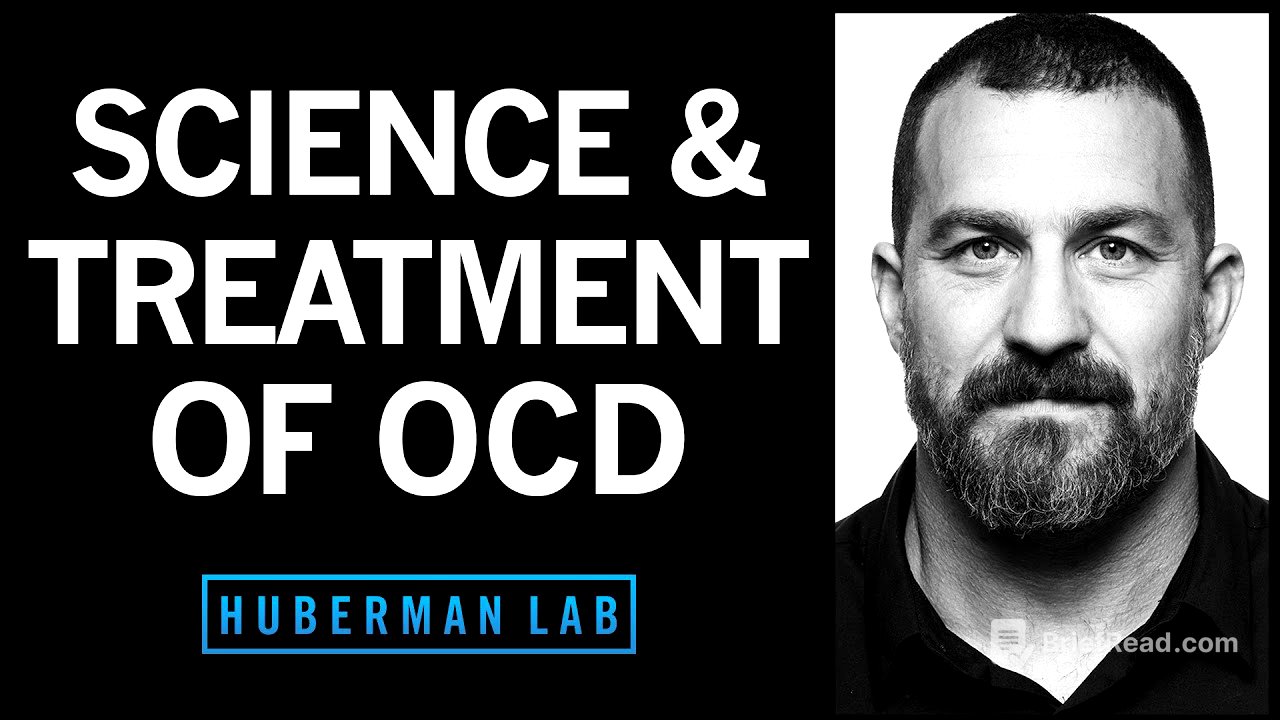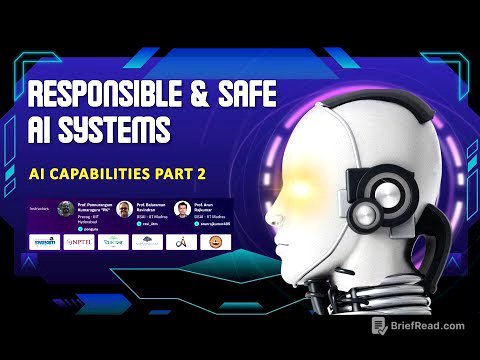TLDR;
Alright, so, this whole podcast episode is about obsessive-compulsive disorder (OCD) and obsessive-compulsive personality disorder. It covers what OCD is, how it's different from just being a bit of a neat freak, and the science behind it. Also, it talks about treatments, from therapy to drugs, and even some more natural approaches.
- OCD is a serious condition, ranking high in debilitating illnesses.
- Key treatments include cognitive behavioral therapy (CBT) and SSRIs, but the order matters.
- Understanding the brain circuits involved can help tailor treatments.
Obsessive-Compulsive Disorder (OCD) [0:00]
The podcast introduces obsessive-compulsive disorder (OCD) and obsessive-compulsive personality disorder, highlighting that many people casually using the term "OCD" might actually have the latter. True OCD is a debilitating condition, ranking seventh among all illnesses in terms of severity. Fortunately, effective treatments exist, ranging from behavioral therapies to medication and brain stimulation, with the specific sequence of these treatments being crucial for success. The episode aims to provide a comprehensive understanding of OCD, its distinctions, and available therapy options, while also offering insights into the brain's mechanisms of thought and action.
Momentous Supplements, AG1 (Athletic Greens), Thesis, Eight Sleep [3:01]
The Huberman Lab Podcast has partnered with Momentous Supplements due to their high quality and comprehensive selection of supplements discussed on the podcast, available at livemomentous.com/huberman with international shipping. Athletic Greens, an all-in-one vitamin-mineral probiotic drink with adaptogens and digestive enzymes, supports the immune, endocrine, and nervous systems, as well as the gut-brain axis. Thesis offers custom nootropics designed to match individual goals and biology, providing personalized blends and free consultations with a coach. Eight Sleep's smart mattress covers use cooling, heating, and sleep tracking to regulate body temperature for improved sleep quality.
What is OCD and Obsessive-Compulsive Personality Disorder? [8:28]
OCD involves intrusive, recurrent thoughts (obsessions) and repetitive behaviors (compulsions) aimed at relieving anxiety caused by these obsessions. However, these compulsions often strengthen the obsessions over time. A key difference from obsessive-compulsive personality disorder is that OCD obsessions are unwanted and distressing, while those with the personality disorder may find their patterns of thought beneficial. OCD is like an itch that gets worse with scratching, unlike the personality disorder where the patterns are more aligned with a desired self-image.
OCD: Major Incidence & Severity [11:18]
OCD is quite common, affecting 2.5% to 4% of the population, but often goes unreported due to shame and the ability to hide symptoms. It's a debilitating condition, ranked seventh among all illnesses, impacting work, relationships, and overall quality of life. The focus on obsessions and compulsions takes time and energy away from other important activities.
Categories of OCD [15:10]
OCD obsessions and compulsions fall into three main categories: checking, repetition, and order. Checking involves repeatedly verifying things like locks or stoves. Repetition includes actions like counting or repeating phrases a certain number of times. Order involves a need for symmetry, completeness, or cleanliness, and can extend to feelings of disgust or contamination. These compulsions can take over various aspects of life, making it impossible to find anything "enough" to remove the obsession.
Anxiety: Linking Obsessions & Compulsions [21:33]
Anxiety links obsessions and compulsions. Obsessions lead to anxiety, which is temporarily relieved by compulsions, but the relief is short-lived, and the obsession strengthens. Anxiety causes a narrowing of visual focus, intensifying focus on the obsession. People with OCD know their thoughts are irrational, yet feel compelled to act. This cycle can lead to depression and even suicidal thoughts.
OCD & Familial Heredity [27:33]
There's a genetic component to OCD in about 40% to 50% of cases, though it's not always directly inherited from parents. Genes can surface in siblings or children without being apparent in parents. While genetics play a role, it's not something one can control, so understanding and managing the condition is more practical.
Biological Mechanisms of OCD, Cortico-Striatal-Thalamic Loops [29:10]
The brain's main functions are housekeeping and predicting future events. Neural circuits connect the brain to the body, influencing actions and creating states of readiness. Research identifies a cortico-striatal-thalamic loop active in OCD, involving the cortex (perception), striatum (action selection), and thalamus (sensory relay). Dysfunction in this loop is thought to underlie OCD.
Cortico-Striatal-Thalamic Loop & OCD [39:36]
Studies involving induced obsessions and brain imaging confirm the cortico-striatal-thalamic loop's role in OCD. Effective drug treatments like SSRIs suppress activity in this circuit. Animal models show that stimulating this circuit can induce OCD-like behavior. A 2013 study in Science demonstrated that stimulating the cortico-striatal circuitry in mice led to incessant grooming, a hallmark of OCD.
Clinical OCD Diagnosis, Y-BOCS Index [46:39]
The Yale-Brown Obsessive Compulsive Scale (Y-BOCS) is a common tool for diagnosing OCD. It defines obsessions as unwelcome, distressing thoughts and compulsions as driven behaviors, even if recognized as senseless. The Y-BOCS includes checklists for aggressive, contamination, sexual, saving, and moral obsessions. It aims to identify the specific fears driving the obsessions and compulsions.
OCD & Fear, Cognitive Behavioral Therapy (CBT) & Exposure Therapy [51:38]
Cognitive behavioral therapy (CBT) and exposure therapy are effective treatments for OCD, focusing on identifying and confronting the deepest fears underlying the obsessions. Unlike other anxiety treatments, CBT for OCD aims to increase anxiety to break the cycle of compulsion and relief. By articulating the specific fear, patients can tolerate anxiety and interrupt the cortico-striatal-thalamic loop.
Unique Characteristics of CBT/Exposure Therapy in OCD Treatment [1:01:56]
CBT and exposure therapy for OCD involve stair-casing, gradually increasing anxiety levels, and assigning homework to practice in familiar environments. Home visits by clinicians help identify triggers and avoidance behaviors. The goal is to tolerate anxiety and resist compulsions, breaking the cycle. Substance abuse is common in OCD as a means to suppress anxiety, but it's counterproductive.
CBT/Exposure Therapy & Selective Serotonin Reuptake Inhibitors (SSRIs) [1:10:18]
Key procedures in CBT include in-person exposures to triggers and preventing compulsive rituals. Goals are to disconfirm fears, challenge beliefs, and break habits. Treatment involves planning sessions and regular exposure sessions. Studies show CBT is highly effective in reducing OCD symptoms. SSRIs also reduce symptoms, but CBT is often more effective. Combining CBT and SSRIs can be beneficial, especially if SSRIs are already in use.
Considerations with SSRIs & Prescription Drug Treatments [1:22:30]
Common SSRIs include fluoxetine, fluvoxamine, paroxetine, sertraline, and citalopram, each with potential side effects like changes in appetite and libido. Side effects can vary and may appear transiently or later in treatment. It's important to consult with a psychiatrist for proper drug selection and dosage. Despite their effectiveness, there's little evidence that the serotonin system is inherently disrupted in OCD.
Serotonin & Cognitive Flexibility, Psilocybin Studies [1:25:17]
Although SSRIs can help manage OCD symptoms, the serotonin system isn't necessarily the root cause of the disorder. Serotonin impacts cognitive flexibility, which is often impaired in OCD. There's growing interest in using psychedelics like psilocybin for OCD treatment, but current studies are inconclusive.
Neuroleptics & Neuromodulators [1:31:50]
For those not responding to CBT or SSRIs, psychiatrists may explore combining SSRIs with neuroleptics, which affect the dopamine and glutamate systems. Neurotransmitters like glutamate and GABA facilitate rapid communication between neurons, while neuromodulators like dopamine and serotonin broadly influence brain activity. Drug treatments act systemically, affecting various circuits and causing side effects.
OCD & Cannabis, THC & CBD [1:36:09]
Some people self-medicate for OCD with cannabis. However, a study found that neither THC nor CBD significantly improved OCD symptoms. Cannabis tends to tighten focus, which may not be beneficial for OCD, as it could intensify obsessions and compulsions.
Ketamine Treatment [1:39:29]
Ketamine, which affects the glutamate system, is being explored for OCD treatment. Early data are promising, but more extensive clinical trials are needed. Ketamine is a legal option by prescription in the United States.
Transcranial Magnetic Stimulation (TMS) [1:41:43]
Transcranial magnetic stimulation (TMS) is a noninvasive technique that uses magnetic energy to stimulate or suppress brain regions. It shows promise in disrupting compulsive behaviors by targeting motor areas. TMS is often used in combination with drug treatments or CBT.
Cannabis CBD & Focus [1:46:22]
Cannabis and CBD may not improve OCD symptoms because they tend to increase focus, which could intensify obsessions and compulsions. This aligns with the idea that OCD involves an excessive focus on specific thoughts and behaviors.
Thoughts Are Not Actions [1:47:50]
A key realization for OCD treatment is understanding that thoughts are not as bad as actions. People with OCD often equate thoughts with actions, leading to distress and compulsions. Recognizing that everyone has disturbing thoughts and that these thoughts don't have to translate into actions is crucial for recovery.
Hormones, Cortisol, DHEA, Testosterone & GABA [1:51:27]
Hormones play a role in OCD. Studies show that females with OCD have elevated cortisol and DHEA, while males have elevated cortisol and reduced testosterone. These hormonal imbalances can affect GABA transmission, potentially increasing excitation in brain circuits. Manipulating hormone levels may be a useful treatment strategy.
Holistic Treatments: Mindfulness Meditation & OCD [2:00:55]
Mindfulness meditation may be useful in OCD treatment by improving focus on cognitive behavioral therapy homework, rather than directly relieving symptoms. The National Institutes of Health now has a division for exploring holistic treatments for psychiatric disorders.
Nutraceuticals & Supplements: Myo-Inositol, Glycine [2:03:28]
Nutraceuticals like inositol and glycine have been explored for OCD treatment. Myo-inositol, in particular, may reduce anxiety and improve sleep. High dosages of inositol and glycine have shown some promise in alleviating OCD symptoms, but more research is needed.
OCD vs. Obsessive Compulsive Personality Disorder [2:09:45]
OCD is distinct from obsessive-compulsive personality disorder. OCD involves intrusive thoughts that disrupt normal functioning, while obsessive-compulsive personality disorder can sometimes be productive. People with obsessive-compulsive personality disorder can delay gratification and may excel in professions requiring precision and order.
Superstitions, Compulsions & Obsessions [2:20:53]
Superstitions are beliefs that certain actions are linked to outcomes, even when there's no rational connection. They can become compulsions when repeated often. People with OCD tend to have more superstitions. Superstitions represent an attempt to generate predictability and control.
Zero-Cost Support, YouTube Feedback, Spotify & Apple Reviews, Sponsors, Momentous Supplements, Instagram, Twitter, Neural Network Newsletter [2:31:00]
Support the podcast by subscribing on YouTube, Spotify, and Apple, leaving reviews, and checking out the sponsors. Momentous Supplements offers high-quality supplements discussed on the podcast. Follow Huberman Lab on Instagram and Twitter for science-related content. Subscribe to the Neural Network Newsletter for toolkits and resources.


![Gautham Govindan | WHATSAPP IS ALL PRIVACY PRIVACY NOW!
.
.
.
.
[Standup comedy, standup India, jokes, WhatsApp, encryption, disappearing messages, feature] | Instagram](https://wm-img.halpindev.com/p-briefread_c-10_b-10/urlb/aHR0cHM6Ly9zY29udGVudC1pYWQzLTIuY2RuaW5zdGFncmFtLmNvbS92L3Q1MS43NTc2MS0xNS81MDMwNjE3NzlfMTg0NTkzMzAwMDEwNzY1NDRfMjk3NzQxMzUzMDg3MjIyMzg3MF9uLmpwZz9zdHA9Y21wMV9kc3QtanBnX2UzNV9zNjQweDY0MF90dDYmX25jX2NhdD0xMDMmY2NiPTEtNyZfbmNfc2lkPTE4ZGU3NCZfbmNfb2hjPXdpWU9TRUVoNWRrUTdrTnZ3R2F6QmI3Jl9uY19vYz1BZGxEd0JtQjRHdjYtdF9XS0NtWklmNzUzUW11aTVJTVAzbE4ySXh3alYtbm9lU3RZcTdJQlFuSXJUX1ZoYXVaMmVjJl9uY196dD0yMyZfbmNfaHQ9c2NvbnRlbnQtaWFkMy0yLmNkbmluc3RhZ3JhbS5jb20mX25jX2dpZD0wR1VETHdZWnVCcG5KWVp6LTZPblhRJm9oPTAwX0FmUXFWQmVBS052UFVRb3hqNWJJT29Ec2c3NVhSWW04LWJSSzZ6TFE1YTMzR0Emb2U9Njg4MDFBQ0M=.jpg)






